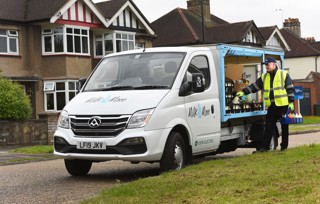The Government expects up to 6,000 additional rapid electric vehicle (EV) chargers will be required across the UK’s motorways and major A roads by 2035.
A £500m Rapid Charging Fund was announced in the March 2020 budget. It will be used to assist where the electrical connection costs of upgrading sites to meet future charging demand is not commercially viable.
The Government said it has undertaken a detailed analysis to assess the number of chargepoints required to meet future en route charging needs along motorways and major A roads.
Currently, a driver is never more than 25 miles away from a rapid (50kW) chargepoint anywhere along England’s motorways and major A roads, with a total of 809 open-access rapid chargepoints, as of January 1 2020. This includes an average of two rapid chargepoints at motorway service areas with more being rolled out over the next year.
As part of the UK’s commitment to end our contribution to climate change, the government is committed to supporting growth of green, zero emission technologies.
It is consulting to bring forward the end of the sale of new petrol and diesel cars and vans to 2035, but realises that extensive public charging infrastructure across the motorways and major A roads is a key part of this transition.
By 2023, it aims to have at least six high powered, open access chargepoints (150 – 350kW) at motorway service areas in England, with some larger sites having as many as 10-12.
By 2030 it is planning for there to be around 2,500 high powered chargepoints across England’s motorways and major A roads.
The Government said the new charging points will allow drivers to pay for the cost of charging their vehicle using debit or credit card payment and there will be clear pricing information available in pence per kilowatt hour.
James Taylor, general manager for Zipcar UK, said: “We are encouraged to see the government’s mission to accelerate the UK’s transition to electric vehicles, as rapid electric vehicle chargers are fundamental to enabling growth.
“However, while great progress is being made, we believe that more needs to be done. A ubiquitous charging infrastructure is vital to the growth of electric vehicles and is key to building consumer confidence in using them. Rapid chargers have a key role to play, but a combination of rapid, fast and more on-street chargers are needed, particularly in urban areas such as London where air pollution levels are usually high.”
Dr Nina Skorupska CBE, chief executive of the REA, added: “This is an important moment for the UK’s electric vehicle sector, one which should give confidence to investors, fleets, and individual drivers alike.”






















Martin Winlow - 14/10/2020 09:25
Long distance travel is one thing - and these proposals are actually a good start and in a reasonable time scale (surprisingly so, IMO) - but they won't address the point made by Zipcar. As well as a plethora of urban on-street charging facilities (which don't need to be the typical fabulously expensive charge-points bought under HMGs grant scheme (a simple weatherised RCBO-protected 13A socket would do for the vast majority of domestic charging), local authorities are going to have to be prepared to accept a certain amount of cross-pavement cabling overnight (using effective anti-trip devices) or agree to cut cable access channels into the pavements to make this all work. Incorporating charge-points into street lights is a start but it is no-where near enough. On top of that, large numbers of rapid chargers - similar in number and type to those mentioned in the article - will be needed at *all* large supermarkets, DIY stores and leisure centres up and down the country. Anywhere, in fact, that motorists go for 30 minutes to an hour on a ~weekly basis.